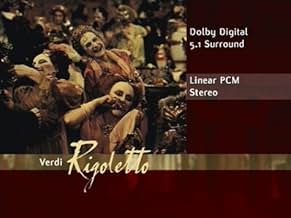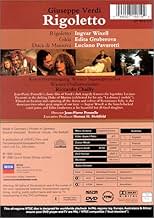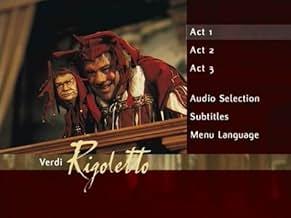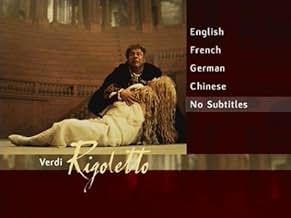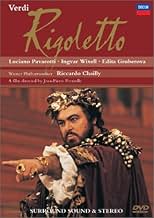Adicionar um enredo no seu idiomaThe Duke lives the high life. The court jester taunts too well. Revenge has unintended consequences both times it is attempted.The Duke lives the high life. The court jester taunts too well. Revenge has unintended consequences both times it is attempted.The Duke lives the high life. The court jester taunts too well. Revenge has unintended consequences both times it is attempted.
- Direção
- Roteiristas
- Artistas
- Direção
- Roteiristas
- Elenco e equipe completos
- Produção, bilheteria e muito mais no IMDbPro
Avaliações em destaque
There is really nothing to say about the musical aspects of this production:it's all very well-done.We have to look at the directoral touches that Ponnelle has left on the production.And,boy,he wrote his name on this in red paint.First,I think that Ponnelle has an obsession with the early Renaissance-look where he placed "The Coronation of Poppea".And Rigoletto is not an early,but a middle Renaissance setting.The ducal court is not only licentious,but also depraved and unsanitary.Mice in the salad!And the party at the beginning throws in everything including the kitchen sink.The minor characters are all strikingly portrayed-and Bracht's cyclopean Ceprano is a physical indication of the corruption and taint of the court.Pavarotti,as the Duke,is a case-book psychopath.Lusty,charming,extroverted,and a creature at the mercy of his appetites and impulses,he lacks the faintest trace of mercy,compassion,and decency.Violent,vicious,and totally without morals,he will,and does destroy anyone who gets in his way.Interesting idea to have Wixell play both Rigoletto and Count Monterone-emphasizes the parallel between the two characters,but you could only do it in a film.Furlanetto's Sparafucile is a clinical example of Paranoid Schizophrenia;this guy is not living in the same reality that the rest of us inhabit.And Gruberova's Gilda,splendidly sung,is a little too sweet for my tastes;the character should display some ambiguous traits.The emphasis in this production is on evil,corruption,depravity,and every other noxious trait on the list.Save Gilda(and the Count of Monterone)none of these portrayals offers a redeeming grace.
I have been a huge fan of opera and classical music since a very early age. And I love Rigoletto, it has a fine story with wonderfully rendered characters. And of course, you can't talk of Rigoletto without mentioning Verdi's music, as is always the case with Verdi, it is outstanding. And this is not just "La Donna e mobile", Gilda's "Caro Nome" and the Quartet, the three best known bits.
I don't know about anybody else, but my personal favourite aria is Duke of Mantua's "Ella mi fu rapita...parmi veder Le lagrime", not just for the energetic start but then with the wonderfully lyrical and poignant second half of the aria, which for me shows that although the Duke is ruthless and a bit of a scoundrel he also has genuine feelings for Gilda. Another favourite is "Si vendetta, tremenda vendetta" which is so powerful when sung really well, the case here, like with Rigoletto's superb Cortigiani.
This 1982 film from Jean Pierre Ponelle is one of my favourite opera films ever, and I have seen a lot. The production values are exquisite, the camera shots are appropriately used, the location shots are breathtaking and we are also treated to lavish costumes and settings. And the singing and acting are top drawer, and helped hugely by the exemplary direction of Jean-Pierre Ponnelle.
Luciano Pavarotti is wonderful as the Duke, I have always been accustomed to his voice(one you recognise immediately upon hearing) which is so effortless at the top if not so much his acting, I can find him a kind of "stand-and-sing" sort of singer. Here though, Pavarotti does show some believable acting ability(see his playful eye contact in "Questo o quella" for instance) and is in great voice. He sings "La Donna e mobile" with real vigour and sings "ella mi fu rapita...parmi veder Le lagrime" beautifully, even if I do slightly prefer Placido Domingo's more poised and thoughtful recording of it under the baton of Sherrill Milnes(who along with Wixell is my personal favourite Rigoletto).
Pavarotti is supported solidly by some quite talented singers and actors. While occasionally a little on the sweet side as Gilda, Edita Gruberova does show a wondrous colouratura register and is suitably vulnerable and ethereal, and even better with the best acting of all the principles-being able to show so many dimensions to the character and wonderfully- is Ingvar Wixell as both Rigoletto and Monterone, which provided a very interesting parallel slant.
All in all, wonderful and I can say it is one of my personal favourites as of now. 10/10 Bethany Cox
I don't know about anybody else, but my personal favourite aria is Duke of Mantua's "Ella mi fu rapita...parmi veder Le lagrime", not just for the energetic start but then with the wonderfully lyrical and poignant second half of the aria, which for me shows that although the Duke is ruthless and a bit of a scoundrel he also has genuine feelings for Gilda. Another favourite is "Si vendetta, tremenda vendetta" which is so powerful when sung really well, the case here, like with Rigoletto's superb Cortigiani.
This 1982 film from Jean Pierre Ponelle is one of my favourite opera films ever, and I have seen a lot. The production values are exquisite, the camera shots are appropriately used, the location shots are breathtaking and we are also treated to lavish costumes and settings. And the singing and acting are top drawer, and helped hugely by the exemplary direction of Jean-Pierre Ponnelle.
Luciano Pavarotti is wonderful as the Duke, I have always been accustomed to his voice(one you recognise immediately upon hearing) which is so effortless at the top if not so much his acting, I can find him a kind of "stand-and-sing" sort of singer. Here though, Pavarotti does show some believable acting ability(see his playful eye contact in "Questo o quella" for instance) and is in great voice. He sings "La Donna e mobile" with real vigour and sings "ella mi fu rapita...parmi veder Le lagrime" beautifully, even if I do slightly prefer Placido Domingo's more poised and thoughtful recording of it under the baton of Sherrill Milnes(who along with Wixell is my personal favourite Rigoletto).
Pavarotti is supported solidly by some quite talented singers and actors. While occasionally a little on the sweet side as Gilda, Edita Gruberova does show a wondrous colouratura register and is suitably vulnerable and ethereal, and even better with the best acting of all the principles-being able to show so many dimensions to the character and wonderfully- is Ingvar Wixell as both Rigoletto and Monterone, which provided a very interesting parallel slant.
All in all, wonderful and I can say it is one of my personal favourites as of now. 10/10 Bethany Cox
The magic of an opera is best experienced by being there, and filmed stage productions sometimes are involving enough that the viewer is able to get an emotional handle on the dramatic situations at the same time experiencing some of the great singing voices of our time; odd that this filmed, dubbed version is so distancing, that during the greatest tragic moment in the opera, the camera looks on from a great distance at a boat in a lake with some opulent city skyline in the background; the same happens in the stunning quartet; in a stage production the viewer can see and hear all four characters simultaneously, and get drawn up in the emotional maelstrom created by incipient murder--not in this version, as the camera cuts from one person to another and occasionally catches duos; that said there are excellent reasons to rent this Rigoletto: Underrated Ingvar Wixell is physically and vocally intense, a great and memorable performance of the lead, and the young Pavarottis voice has few rivals (although he distances himself from other singers); there are some fascinating visual concepts in Act I, and the entire opera is easy to follow--but there are better versions on DVD and the 2012 Met Version, set in Las Vegas, is a visual and aural knockout.
But this is not an Opera filmed on a theater. It is a movie. As such the scenes are not of a theatrical production and many are in exteriors. You will not see the Orchestra pit nor the Maestro.
This requires singers that are also good actors. Pavarotti, not always a good actor in the stage, comes out superb, but the best acting performance is Ingvar Wixell, as Rigoletto.
The female roles are very inferior. Edita Gruberova is totally visually inadequate for the role of Gilda, She looks like an old witch, and totally ruins all her scenes. Madallena is a bit more credible as a "putanna", with some feelings.
This requires singers that are also good actors. Pavarotti, not always a good actor in the stage, comes out superb, but the best acting performance is Ingvar Wixell, as Rigoletto.
The female roles are very inferior. Edita Gruberova is totally visually inadequate for the role of Gilda, She looks like an old witch, and totally ruins all her scenes. Madallena is a bit more credible as a "putanna", with some feelings.
I like the good things in life as much as anybody, I suppose, but until about five years ago, opera didn't figure into my entertainment choices. Oh, I made a few attempts to learn what all the fuss was about; I'd watched several television productions -- notably parts of Wagner's Ring Cycle on public television -- hoping to understand other people's fascination with the art form. And I knew I could like parts of various operas (I remember being surprised as a kid that I actually LIKED the snippets of "Madame Butterfly" in "My Geisha, and I enjoyed the opera scenes in "Moonstruck" and "Pretty Woman"), but unlike the characters in those films, I just didn't "get it."
Then in 1995 I saw a live performance of "Rigoletto" presented by the New York City Opera Company, and that night I "got it." What a wonderful, glorious pageant of color and music and raw Emotion! And I do mean Emotion with a capital E! The key, I think, is that the operatic music allows the performers to over-act freely and believably in a way that would seem silly if their words were just spoken. Everything hinges on the music, of course, and when the music is magical, as it is in "Rigoletto," an opera can be a magnificent entertainment.
A sympathetic family member gave me a laserdisc copy of the 1982 TV production of the opera, and I've found that since I can't see live performances of "Rigoletto" live on a regular basis, this video version is a fine substitute. Luciano Pavarotti is perfect in the part of the Duke; Ingvar Wixell is excellent as his mean-spirited court jester Rigoletto; and Rigoletto's beloved daughter Gilda is played by the somewhat plain-featured Edita Gruberova. The sets and costumes are lavish, and the location shots on the river late in the film bring a heightened sense of drama to the story that could never be matched on a stage.
If you've never seen "Rigoletto," or if you think you don't like or understand opera, I urge you to find this one on videotape and buy it or rent it. If you don't like this, if this production of "Rigoletto" doesn't make you appreciate the power of the art form of opera, well, just give it up and move on to something else. But I suspect, if you're new to opera as I was, that you'll be pleasantly surprised.
Bill Anderson
Then in 1995 I saw a live performance of "Rigoletto" presented by the New York City Opera Company, and that night I "got it." What a wonderful, glorious pageant of color and music and raw Emotion! And I do mean Emotion with a capital E! The key, I think, is that the operatic music allows the performers to over-act freely and believably in a way that would seem silly if their words were just spoken. Everything hinges on the music, of course, and when the music is magical, as it is in "Rigoletto," an opera can be a magnificent entertainment.
A sympathetic family member gave me a laserdisc copy of the 1982 TV production of the opera, and I've found that since I can't see live performances of "Rigoletto" live on a regular basis, this video version is a fine substitute. Luciano Pavarotti is perfect in the part of the Duke; Ingvar Wixell is excellent as his mean-spirited court jester Rigoletto; and Rigoletto's beloved daughter Gilda is played by the somewhat plain-featured Edita Gruberova. The sets and costumes are lavish, and the location shots on the river late in the film bring a heightened sense of drama to the story that could never be matched on a stage.
If you've never seen "Rigoletto," or if you think you don't like or understand opera, I urge you to find this one on videotape and buy it or rent it. If you don't like this, if this production of "Rigoletto" doesn't make you appreciate the power of the art form of opera, well, just give it up and move on to something else. But I suspect, if you're new to opera as I was, that you'll be pleasantly surprised.
Bill Anderson
Você sabia?
Principais escolhas
Faça login para avaliar e ver a lista de recomendações personalizadas
Detalhes
- Tempo de duração
- 2 h 8 min(128 min)
- Cor
- Proporção
- 1.37 : 1
Contribua para esta página
Sugerir uma alteração ou adicionar conteúdo ausente


